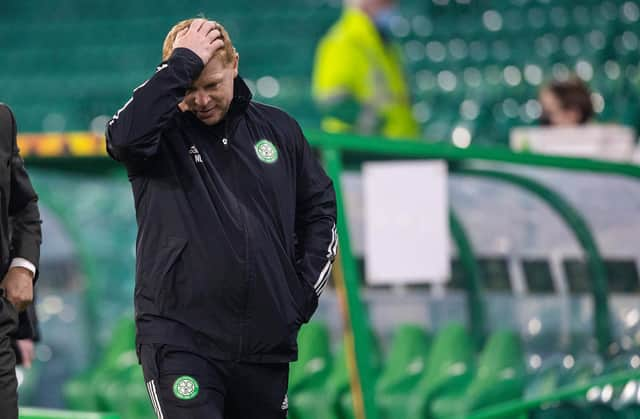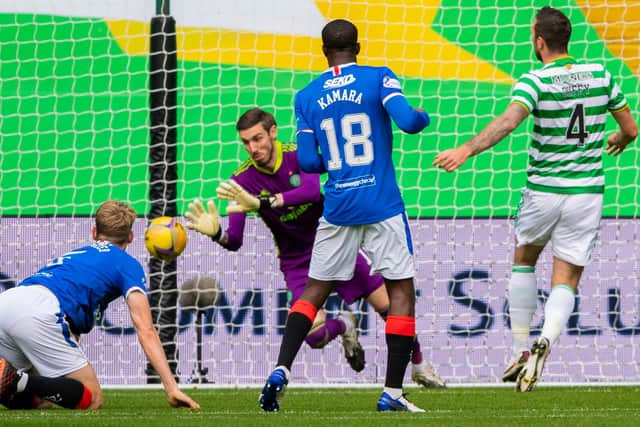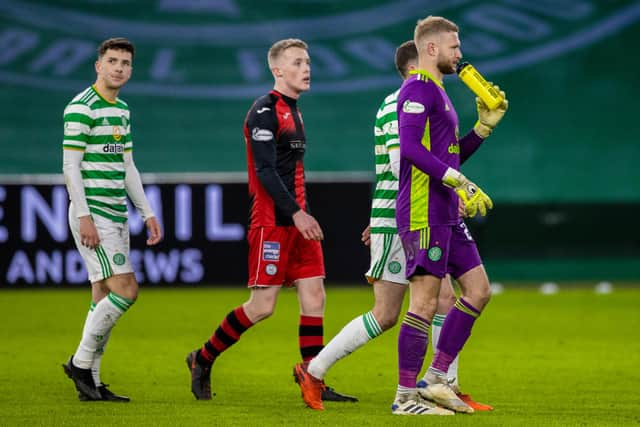How an empty Parkhead stadium has become a tomb for Celtic in tortured 10 tilt


When they face Motherwell on Saturday, the imperative for Celtic will be to build on what was - for this season, at least - an unusually authoritative victory that snared them a midweek 4-0 success at Kilmarnock. Owing to that need for further rehabilitation, it is no stretch to consider they could privately rue the fact the follow-up fixture to their Ayrshire breath of fresh air will be staged within the Parkhead area.
Not simply because the confrontation will return them to the scene of their criminal showing from last Saturday, when St Mirren earned a first victory in Glasgow’s east end since April 1990. Instead, a certain aversion to their own environs is attributable to the fact Celtic Park has been the scene of all the club’s most grievous crimes in a sorry season reading like a charge sheet for Neil Lennon’s men.
Advertisement
Hide AdAdvertisement
Hide AdA stadium that in pre-Covid 19 times would crackle through the ferocity of capacity crowds to draw a similar intensity from their on-field favourites is, in this fan-free campaign, less coliseum and more mausoleum. In all manner of ways. The vertiginous, cantilever stands seem to accentuate the cavernous, gloomy nature of the arena when deserted. The arena can feel eerily unwelcoming. And it has certainly coincided with some desperately unengaged displays from the home team.


In effect, Celtic’s failure to compete in four tournaments over the past six months comes down to failures on the home front. The latest and gravest in the St Mirren shocker made for more than an unwanted three-decades first. It marked the first time Celtic have lost a league game to anyone but Rangers in their own backyard during a live championship since December 2015. They were beaten at home by Aberdeen in the final Premiership encounter of the 2017-18 season, but that came a fortnight after they had tied up the title.
The Celtic Park draws with Livingston - in post Dubai January, without the coronavirus 13 - and St Johnstone, while not quite as pathetic as the performance against the Paisley team, were strictly from the bottom drawer. It should be recalled that the violent protests that ensued from the point scraped against the Perth men were provoked by two factors: this December encounter not only condemned Lennon’s men to a record of two wins in 12, but left them five straight home games without a victory. The club had not endured such a sequence since 1957-58. A second successive Sunday evening of pitchfork-and-flaming-torch-congregating outside the stadium, the first had been inspired by the League Cup loss to Ross County. An almighty upset that ended the club’s record run of 35 straight cup-tie successes.
A few weeks earlier, Celtic Park bore witness to a 4-1 humiliation for Lennon’s men against Sparta Prague in the Europa League that effectively ended any group qualification hopes. Moreover, in light of the fact the Czechs were depleted and hadn’t played in a month, it unquestionably stands as Celtic’s worst home showing across the 59 years they have participated in continental competition. Outside of qualifiers, it is only the third time they have conceded four goals in a home European game.
The slide into Celtic’s sorrowful sequence that ended the crazed-over pursuit of a record 10th championship began with their 2-0 derby defeat in mid-October. A confrontation notable for their inability to fashion a single shot on target. It proved the first of three home outings across all competitions this season in which they have not been able to conjure up a goal. Contrast that with only one such game away - and this the new year Ibrox meeting of the ancient rivals in which only two stupendous blocks from Allan McGregor prevented them doing so.


The home heartache began way back in August with their first ousting from a competition. It took the form of the 2-1 defeat by Ferencvaros that ended their interest in the Champions League at the second qualifying stage. An outcome that brought their earliest exit from the elite competition in 15 years. Of course, there have been some fine displays from Celtic on their own patch. Into that bracket can be placed the thrilling 3-2 success over Lille in December, and the 3-0 victory over Hibs in September. However, the split of points spilled in the league between home and away games is a telling pointer to their greater struggles at Celtic Park than on the road. It is a tension replicated across the entire English top flight, where 52% of games have been won by away teams - an all-time high. Further evidence the Covid-19 supporterless age is having a dramatic impact across football.
The specifics for Celtic are that they have dropped 11 points away, but 12 at home. Despite playing once more at home than away in the Premiership, they have scored more goals and boast a better goal difference from their 12 assignments outside of Celtic Park than the 13 staged there. Indeed, for all Celtic’s myriad shortcomings this season, their away league form compares favourably with some recent title winning seasons. They have dropped only two more points from their first 12 league away games than in Brendan Rodgers’ second championship winning season of 2017-18, and actually seven points fewer than the half season Rodgers was in charge for that followed. For all the myths peddled about a slow decline since Lennon took charge permanently again in May 2019, last season he hauled up points-gathering both away, and at home for that matter, compared to Rodgers’ second, and last, full season.
That 2019-20 campaign seems but a distant memory as Celtic players have switched off at crucial moments in succumbing to a brittleness and soullessness fatal to their ambitions. All too often, in their own soulless environs. A place where the cacophony has been replaced with echoing cries for help.
A message from the Editor:
Thank you for reading this article. We're more reliant on your support than ever as the shift in consumer habits brought about by coronavirus impacts our advertisers. If you haven't already, please consider supporting our trusted, fact-checked journalism by taking out a digital subscription.
Comments
Want to join the conversation? Please or to comment on this article.